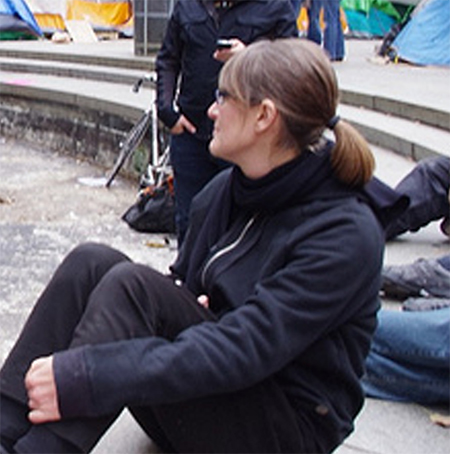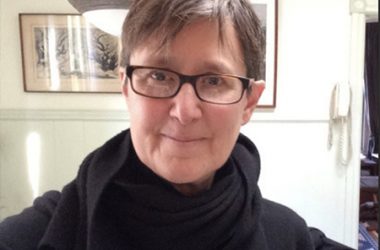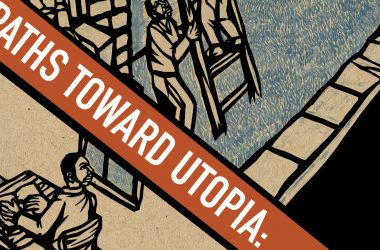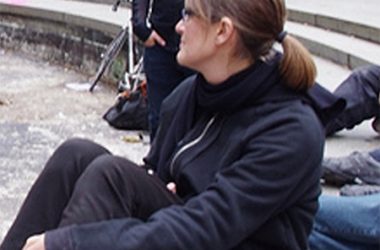
On the one hand, we need a certain amount of faith in life in order to keep moving through it with a modicum of hope. We need to have faith in something to propel us through a world that’s frequently harsh, unforgiving and unkind, and full of way too much inexplicable suffering. On the other hand, too often faith is simply “a matter of faith,” held as thoughtlessly accepted beliefs, whether found in organized religion or within activist circles. We hang on for dear life to principles that appear steadfast and safe as a replacement for the harder work of sitting with all the uncertainty of life, all the dilemmas it drops at our feet, time and again, and how to continually contemplate our responses.
So much of faith in anything hinges on the words we put to it, how we describe its shape and feel, its ethics and values, its practices. It can be a feeling, too, but even that only becomes legible through the words we use to portray those sensations. Faith can be a bible, or it can be works that get debated in relation to various circumstances; it can be laws, commandments, mystical signals, or an elastic framework; it can ask us to sign on the dotted line or be a promise that we revisit repetitively, based on changing contexts. Its words, its language, can stagnate, or we can delight in always building our vocabulary.
Faith has to have a vision, and that vista is captured in how we learn to speak of its contours. Whether inside our head or on the tips of our tongue, words form the landscape of our sense of possibility, our everyday utopias, our heavens on earth.
And so when we practice our faiths in this less-than-heavenly society, we put our stock in ways to make this world more closely match up to our ideals. For instance, one way we attempt to avoid hurt and right wrongs like patriarchy in political organizing efforts is to demand that people “step up, step back” in discussions, as if the sheer number of words that one speaks — or doesn’t — has a relation to wisdom, or the freedom and dignity, say, that we wish to articulate, instill, and enact. We who decry capitalism put our faith in ledger sheets of accountability: who has talked a lot, and who hasn’t; which voices attached to which bodies have spoken or not, and how frequently, or without interrupting. Such faith is the cold, hard cash of a bankrupt language of social transformation, in which we forget how to listen, how to dialogue, how to speak truth and beauty, how to bond through giving each other the benefit of the doubt and allowing ourselves to share our vulnerabilities, how to take responsibility for ourselves and how we impact those around us.
Contrast this to a teaching imparted through the faith of dharma, or at least a lesson learned for me this past week at a guided meditation, skeptically attended at the suggestion of my new and insightful therapist. She thought it might speak to questions of loss and suffering, and how we approach being present with those spaces, those absences, and recognizing what’s filling them in again. After the mediation, the teacher gave a talk on “wise words” and “wise actions,” and the intimate relation between the two, alongside some of their values, like truth and kindness. The counter, of course, is “unwise words” and “unwise actions,” or words and actions that pain others, that cause suffering, rather than strive to alleviate it for us and others. His discussion centered on the power of words. Like folks within activist worlds, because this was a punk sort of dharma, he spoke of paying attention when we’re in groups to who speaks or doesn’t, what voices are heard, what bodies feel comfortable intervening, and who interrupts. But he then offered this gem, this touchstone:
Are our words worth breaking the beauty of the silence?
The corollary, I might add, is that by bringing words into the world, we aspire to bring beauty into it, and that us struggling to give voice and then actions to that beauty has to involve intentionality, care, and wisdom — otherwise, why speak? Why shatter the beauty of the silence?
Such a gem calls into question the superiority of those who talk a lot, without regard for beauty; those who choose to use words and the actions that follow from them as forms of domination, as instruments of perpetuating suffering, not merely in small organizing projects, but as mechanisms writ much larger in structures like patriarchy, white supremacy, or statecraft. It also elevates the notion, for me at least, that the absences we imagine — the absence of heteronormativity, racism, or capitalism — are indeed those beautiful silences. They are quiet places that aren’t yet able to be heard in the here and now, even by us rebel-dreamers. When push comes to shove, when we try to give voice to it, we really have little language to describe the absences we fight so fiercely for, especially against all that roars deafeningly at us, beating us down with its weight and volume, shouting down possibility. What if we deliberately took the time to listen hard to the silence, to pick up whispers of potentiality, gentle and quiet clouds of hope, noiseless butterfly-wings of promise?
In the stillness, maybe we can hear other worlds beckoning, more beautiful than can yet be fully expressed in wise words and wise actions, much as we should try.
* * *
(Photo by Cindy Milstein, from a time of solitude amid suffering and beauty, East Lansing, MI, September 2013)




